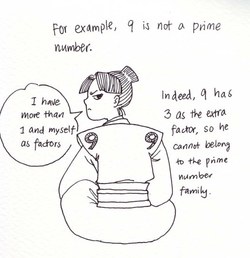Only numbers!
 Determine the largest 3 digit prime factor of
(
1
0
0
0
2
0
0
0
)
,
Determine the largest 3 digit prime factor of
(
1
0
0
0
2
0
0
0
)
,
where ( r n ) = r ! × ( n − r ) ! n ! .
The answer is 661.
This section requires Javascript.
You are seeing this because something didn't load right. We suggest you, (a) try
refreshing the page, (b) enabling javascript if it is disabled on your browser and,
finally, (c)
loading the
non-javascript version of this page
. We're sorry about the hassle.
2 solutions
Did the same way sir .
Sir I can't understand ,why are you devide 2000 by 3
Log in to reply
Sorry, I should mention the 3-digit primes remaining. All the 3-digit primes appear once in the denominator. They can appear once to 10 times in the nominator. For example, 9 9 1 appears only once as 1 9 8 2 = 9 9 1 × 2 , but 1 0 1 appears 10 times 1 0 1 0 , 1 1 1 1 , 1 2 1 2 , . . . , 1 9 1 9 . Since all the 3-digit primes appear once in the nominator are cancelled by those in the denominator, what remain are those appear more than once in the nominator, and the larger ones appear twice. Generally the 3-digit primes that appear once in the nominator are > 2 0 0 0 ÷ 3 and the 3-digit primes that appear more than once are < 2 0 0 0 ÷ 3 .
If
p
is a prime such that
6
6
6
<
p
<
1
0
0
0
, then the only numbers
≤
2
0
0
0
, which are divisible by
p
are
p
and
2
p
. Therefore the highest power of
p
which divides
2
0
0
0
!
is
p
2
.
Obviously, the highest power of
p
dividing
1
0
0
0
!
is
p
itself.
Since
(
1
0
0
0
2
0
0
0
)
=
(
1
0
0
0
!
)
2
2
0
0
0
!
,
p
does not divide
(
1
0
0
0
2
0
0
0
)
.
So let p be the largest prime less than 6 6 6 , viz., 6 6 1 .
It is obvious that the highest powers of p which divide 2 0 0 0 ! and ( 1 0 0 0 ! ) 2 are p 3 and p 2 respectively; therefore p divides ( 1 0 0 0 2 0 0 0 ) .
So. answer : 6 6 1 .
( 2 0 0 0 1 0 0 0 ) = 1 × 2 × 3 × . . . × 1 0 0 0 2 0 0 0 × 1 9 9 9 × 1 9 9 8 × . . . × 1 0 0 1
All the divisors including the primes are cancelled out. The 3-digit primes in the nominator not cancelled out are those < 2 0 0 0 ÷ 3 and the largest of which is 6 6 1 .